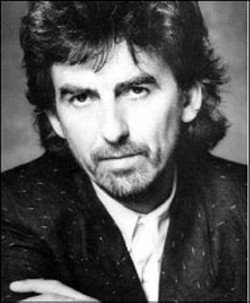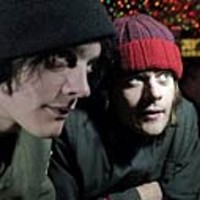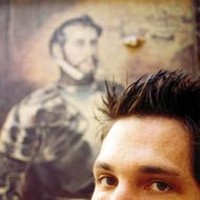For a long time, the model fit like a glove. Buddy and Otis tumbled down from the heavens; Janis and Gram modeled overdose chic; Bonham and Moon boozed until last call then drove their limos into the great rock star swimming pool in the sky; The Lizard King swooned and expired in the arms of the French poets; on the third day, Elvis pushed back the slab and hitched a ride to Burger King.
And John Lennon's demise was perfect, a grand Shakespearian tragedy of sorts complete with backstabbing associates, a scheming Asian paramour and a delusional disciple-turned-assassin who ruptured our culture in the space of a terse salutation.
Then we grew up, rock's romantic myths were replaced by aging's hard realities, and we confronted cancer, heart attacks and the wages of getting older. Just in the past 12 months we've lost Joey Ramone, John Fahey, Pops Staples, Perry Como, Chet Atkins, Fred Neil, Papa John Phillips, Mimi Farina, Michael Karoli of Can, John Lee Hooker; not a Shakespearian tragedy or pyre of self-immolation among 'em. Now George Harrison.
Even from the outset, the Quiet Beatle seemed enigmatic. Continuing to embrace elements of Eastern spirituality and mysticism long after his bandmates abandoned their dalliances only made George seem more apart. His arc began to diverge in earnest in 1968 when he journeyed to Woodstock over Thanksgiving to hang out with Bob Dylan. Returning home, he realized that his songwriting batteries had unexpectedly been recharged; within a month he'd be walking out on his fellow Beatles in the middle of the fractious recording sessions for Let It Be. He did return to the fold to finish that album as well as Abbey Road, but despite common wisdom that tells us it was Yoko who fractured the Beatles and Paul who formalized the final split, in truth George had already left the band in spirit, stockpiling much of his better material and planning his solo escape -- and of course there's no such thing as a Fab Three.
All Things Must Pass, released in 1970, was a diversely drawn but sonically cohesive masterpiece. The ornately packaged album (rock's first triple LP set) boasted the talents of a virtual supergroup (Badfinger, Billy Preston, Ringo Starr, Dave Mason, Eric Clapton and his soon-to-be Dominos, etc.) and shot to the top of the charts. It was quite a coming-out jubilee for George, a celebration that would extend even further into the next year with the Concert for Bangla Desh. Not only did the humanitarian benefit draw up the blueprint for future rock and charity intersections, it saw George score a massive PR coup: the return of Bob Dylan.
In a sense, the solo album and the benefit concert combined to set an impossibly high standard for the ex-Beatle. He never fully reached it again despite scoring numerous subsequent hits (1987's Cloud Nine earned the blessing of MTV) and engaging in various activities that enhanced his image as a culturally hip arts patron, a generous philanthropist and a self-effacing, all around good chap. Also, by carefully cultivating friendships with the likes of fellow musicians Eric Clapton, Ravi Shankar and Traveling Wilburys Dylan, Petty, Lynne and Orbison, George revealed himself to be the sort who valued tradition, songcraft and comradeship over calculation, glitz and celebrity. (It would be hard to imagine George teaming up with a Rob Thomas or a Lenny Kravitz purely because he wanted to connect with a "modern" audience.) So maybe, unlike a lot of celebrity hand-wringers constantly at odds with the "relevancy" issue, George simply understood and derived satisfaction from how that high standard actually represented a worthy goal for others to aim for.
George was born in Liverpool on February 25, 1943. He died on Thursday, November 29, 2001, at a friend's Los Angeles home, following a protracted battle with cancer. According to a widely circulated statement issued by the Harrison family, "He left this world as he lived in it, conscious of God, fearless of death, and at peace, surrounded by family and friends. He often said, `Everything else can wait but the search for God cannot wait, and love one
another.'''
In the inevitable obituaries and retrospectives that began appearing within hours of George's death, amid all the standard-issue treatments of The Beatles' legacy that practically any baby-boomer can recite in his sleep, there were a few unexpectedly thoughtful touches. On Friday night VH1, if you can believe it, unearthed a wonderful '97 interview and impromptu acoustic performance from the time when George and Ravi Shankar dropped by the cable channel's studio to promote a recent Shankar album on George's Dark Horse label. A few nights later, at the otherwise pedestrian and predictable "My VH1 Music Awards '01," Jon Bon Jovi and Richie Sambora, accompanied by a cellist, opened the live broadcast with a deeply moving rendition of Here Comes the Sun.
Veteran rock critic and professional curmudgeon Dave Marsh, in one of his provocative but always thoughtful weekly screeds, opined, "I'm writing this soon after learning that George Harrison died, which comes just at a moment when I am feeling up for a quarrel with someone about death. It might as well be George." Marsh went on to outline how he's frankly sick to death of death because there's been too much of it in his life lately, from family members to friends to a correspondent who's scheduled to be executed shortly by the state of Georgia. He then took the departed Beatle to task, rhetorically, for devoting himself to religious mysticism when its advocacy of reconciliation towards death suggests we shouldn't worry about or dwell upon it. Concluded Marsh, "What I want to know is this: If it's all just an illusion, how come it hurts so goddamn much?"
(I'm not sure how George would answer that. Perhaps he'd just shrug and quote from his song "Isn't It A Pity": "Some things take so long, but how do I explain?/ When not too many people/ Can see we're all the same/ And because of all the tears/ Their eyes can't hope to see/ The beauty that surrounds them/ Oh isn't it a pity.")
At rock journalism website Rocksbackpages.com, British journalist Mat Snow reflected not upon George's obvious traits but his contrasting, even conflicting, ones. In the essay, George was characterized as a man who could write a song bitterly/sarcastically lambasting the "Taxman"; then turn around and hand out huge wads of dough to every flower-toting Hare Krishna who appeared on his mansion's stoop; a man who one year would be at the forefront of rock's investigations into Eastern and electronic music and the next be enthusiastically bending all ears about the genius of The Band's Americana prototype Music From Big Pink; a man who'd delight at The Rutles' skewering of the Beatles' myth yet would countenance no disrespect of the actual personalities -- and sternly rebuking those who curried favor by lauding his talents over those of John, Paul or Ringo. As McCartney put it, "George didn't suffer fools gladly."
Snow summarized it this way: "Friendly, grouchy, kind, grudging, selfless, resentful, materialistic, unworldly. The paradoxes stack up, but they do not balance. We'll all be doing a lot more thinking about George in the days to come. And with good reason we will feel his loss, for a loss it is. George Harrison: probably not a saint, but certainly a lot more human than most."
So there I am the day after, up early with my infant son, drinking coffee and learning of George's death from a radio report. The kid is pretty much oblivious to everything, material or metaphysical world, save his morning ritual of happily demolishing his toy shelf. Meanwhile, I'm going about a peculiar ritual of my own whenever I hear we've lost another musical icon: going numb, getting choked up, then feeling intensely in need of some close human contact.
Later in the day I'll take my son and his mother out for a long ride through the country. All Things Must Pass will be our cruising soundtrack and the recent remastered/expanded CD edition will sound spectacular, its rootsy, burnished vibe combining with touches of producer Phil Spector's Brill-pop wall-of-sound signature to fairly leap out of the car stereo speakers. The tunes will come rushing back: the sweetly tenored folkrock of the Harrison/Dylan-penned "I'd Have You Anytime"; and the gentle reworking of Dylan's "If Not For You"; the anthemic, orchestral "Wah-Wah"; and "What Is Life"; the cautionary, contemplative yin of "Beware of Darkness"; and the jocular, celebratory yang of "Apple Scruffs"; and of course "My Sweet Lord" which neither time nor lawsuit can diminish.
But that's several hours away. Right now I'm setting down my coffee and going across the room to pluck up my son. The radio starts to play one of my favorite songs. Singing along with it, I start to chant softly, then louder, "Sun, sun, sun, here it comes. . ." over and over. He studies me briefly, then begins to giggle and thump my chest in a perfect cadence. All things, it seems, do eventually pass.*
Latest in Vibes
More by Fred Mills
-
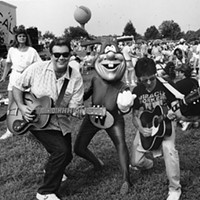
Rock through the first five years
Apr 11, 2007 -
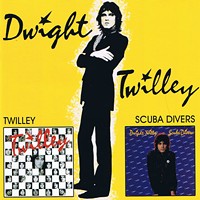
Dwight Twilley
Feb 7, 2007 -

Space Needle
Jan 24, 2007 - More »
-
The Man, The Myth -- Renelvis
-
Good Eats
Our critics' guide to recommended restaurants in Charlotte
-
Good Eats
Our critics' guide to recommended restaurants in Charlotte

